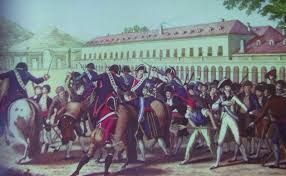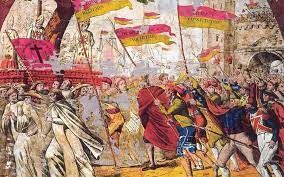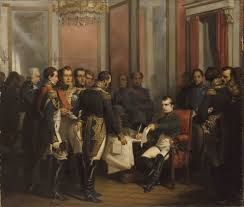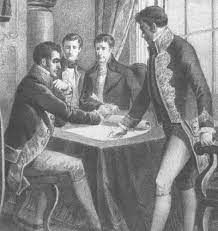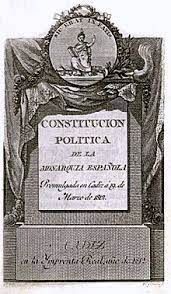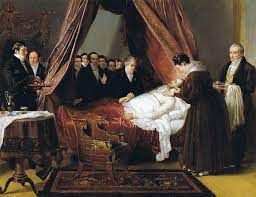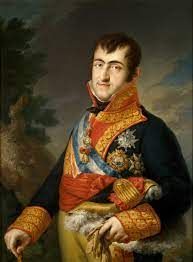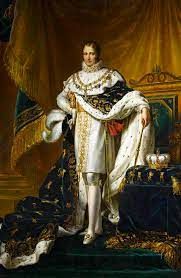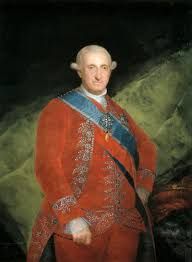Want to create interactive content? It’s easy in Genially!
TIMELINE: Spanish history
Alicia Claveria
Created on November 30, 2023
Start designing with a free template
Discover more than 1500 professional designs like these:
Transcript
TIMELINE: SPANISH HISTORY
1808
1823
1807
1813
1812
1823
1833
1 of october
1808
1788
27 of october
6 of june
11 of december
19 of march
29 of september
17 of march
+info
+info
+info
+info
+info
Alicia Clavería
TIMELINE: SPANISH HISTORY
1837
1870
1868
1846
1833
1851
1840
1868-1874
18 of june
16 of november
september
6 of october
30 of may
+info
+info
+info
+info
Alicia Clavería
TIMELINE: SPANISH HISTORY
1904
1876
1923
1914
1906
1872
1885
1917
21 of april
26 of november
+info
+info
+info
+info
Alicia Clavería
19XX
Lorem ipsum dolor sit
Sed ut perspiciatis unde omnis iste natus error sit voluptatem accusantium doloremque laudantium, totam rem aperiam, eaque ipsa quae ab illo inventore veritatis et quasi architecto beatae vitae dicta sunt explicabo. Nemo enim ipsam voluptatem quia voluptas sit aspernatur aut odit aut fugit.
1788
Carlos III led to Carlos IV's
In 1788, Carlos III ruled Spain, focusing on reforms. His death led to Carlos IV's reign, marked by political instability and Napoleonic influence, ultimately contributing to Spain's decline.
1808- 17 of march
The Aranjuez munity
The Aranjuez Mutiny (1808) in Spain was a popular uprising against King Charles IV and his minister Godoy, triggered by discontent over social issues, leading to abdication and political changes.
1807- 27 of october
Treaty of Fontaibebleau
The Treaty of Fontainebleau (1807) divided Spain between France and the ally Bourbon dynasty, paving the way for Napoleon's control and the establishment of Joseph Bonaparte as the puppet king.
1823- 1 of october
Fernando VII
On October 1, 1823, Fernando VII of Spain, with French support, crushed liberal uprisings in the Trienio Liberal, restoring absolutism and suppressing constitutional reforms, marking the start of the Ominous Decade.
1823
Trienio Liberal
In 1823, during the Trienio Liberal period in Spain, the French, led by the Duke of Angoulême, intervened to restore absolute monarchy. They occupied the Royal Palace in Madrid, suppressing liberal forces.
1812- 19 of march
Constitution of Cádiz
On March 19, 1812, Spain promulgated the liberal Constitution of Cádiz during the Peninsular War. It established principles of constitutional monarchy, individual rights, and limited royal power, influencing subsequent constitutions.
1833- 29 of september
Fernando VII's death
Fernando VII's death in 1833 left a legacy of dynastic conflict. His daughter Isabel II, aged 3, and Luisa Fernanda became key figures. Infante Carlos claimed the throne, but María Cristina, as regent, initiated reforms, including amnesty and university reopening.
1808- 6 of june
Joseph Bonaparte
On June 6, 1808, Napoleon's brother, Joseph Bonaparte, was declared King of Spain by the French army, escalating tensions and sparking resistance, fueling the broader Peninsular War.
1813- 11 of december
Treaty of Valençay
On December 11, 1813, the Treaty of Valençay was signed, securing the release of Ferdinand VII of Spain from captivity in France, marking the end of French occupation in Spain.
1833- 6 of october
First carlist war
On October 6, 1833, the death of Ferdinand VII led to a power struggle, igniting the First Carlist War in Spain, as his daughter Isabel II's claim to the throne was contested.
1840- 30 of may
End of first carlist war
On May 30, 1840, during the Carlist War in Spain, the Liberals, led by Baldomero Espartero, achieved a significant victory against the Carlists at the Battle of Mendigorría, consolidating their control. This marked the end of the carlist war.
1837- 18 of june
Spains liberal Constitution
On June 18, 1837, Spain's liberal Constitution of 1837 was promulgated, introducing constitutional monarchy. This marked a shift toward a more moderate political stance during the regency of Maria Christina.
1870- 16 of november
Amadeo I of Savoy
On September 16, 1870, Amadeo I of Savoy was proclaimed King of Spain, succeeding the abdicated Isabella II. His reign faced political challenges, and he eventually abdicated in 1873.
1868-1874
Spain's Liberal Sexenio
Spain's Liberal Sexenio (1868-1874) witnessed political instability, social reforms, and the creation of a democratic constitution. However, internal strife, Carlist uprisings, and external pressures led to its eventual collapse.
1851
holy see
In 1851, Spain reached a concordat with the Holy See, re-establishing relations between the Spanish government and the Catholic Church after years of tension and conflict over ecclesiastical matters.
1846
second carlist war
In September 1846, the Second Carlist War erupted in Spain, a conflict between the supporters of Isabella II and the Carlists, seeking the throne for Carlos, triggering a prolonged struggle.
1868
Glorious revolution
In 1868, the Glorious Revolution in Spain led to the overthrow of Queen Isabella II, marking the end of her reign and the beginning of a transitional period towards democratic reforms.
1917
Russian Revolution
In 1917, the Russian Revolution influenced Spain, sparking social and political unrest. Workers' strikes and anarchist movements surged, contributing to Spain's growing revolutionary fervor and setting the stage for change.
1876
Juan Carlos I
In 1976, Spain embarked on political reforms, initiating the transition to democracy. King Juan Carlos I played a crucial role, leading to the approval of the Constitution in 1978, establishing democratic governance.
1885- 26 of november
death of Alfonso XII
On November 26, 1885, the death of King Alfonso XII of Spain ended a period of stability. His passing triggered political uncertainties, as his successor, the infant Alfonso XIII, was too young.
1872- 21 of april
Third carlist war
On April 21, 1872, Spain faced internal conflict during the Third Carlist War. The Carlist forces suffered a major defeat at the Battle of Alpens, weakening their position in the war.
1904
José de Echegaray
In 1904, Spanish mathematician and playwright José de Echegaray was awarded the Nobel Prize in Literature, recognizing his significant contributions to both mathematics and dramatic literature.
1906
Santiago Ramón y Cajal
In 1906, Santiago Ramón y Cajal, a Spanish neuroscientist, was awarded the Nobel Prize in Physiology or Medicine for his groundbreaking work on the structure of the nervous system.
1914
Neutrality during World War I
In 1914, Spain maintained a policy of neutrality during World War I, avoiding direct involvement. Despite internal divisions, Spain remained unscathed and focused on domestic issues during the conflict.
1923
Primo de Rivera
In 1923, General Primo de Rivera staged a coup, establishing a military dictatorship in Spain. His regime aimed to restore order but faced economic challenges, leading to political discontent.
